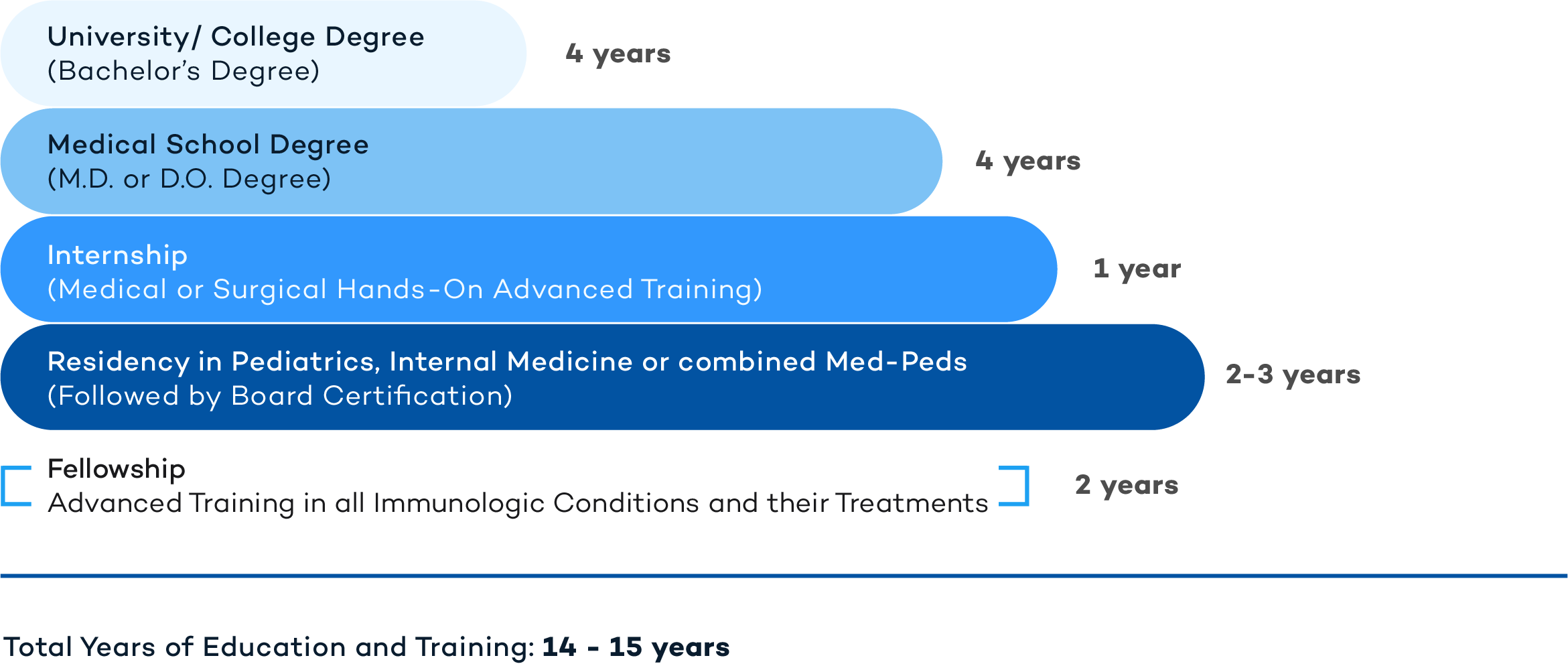

An Allergist or Immunologist, also known commonly as an Allergist, is a Board-Certified Doctor who specializes in treating, diagnosing, and managing disorders of the immune system, focusing on: asthma, allergies, and immunological disorders including primary immunodeficiency disorders. These physicians manage disorders in which the immune system reacts abnormally to otherwise innocuous or harmless foreign substances.
The level of expertise to treat a specific condition and the associated training credentials are important factors to consider when choosing the right physician. Typically, your Primary Care Doctor (Internal Medicine or Family Medicine) or Pediatrician will refer you to a qualified Allergist. At myDoqter, we facilitate this process by providing you with access to the professional recommendations given by other physicians who have witnessed first-hand the expertise and professional competency of your Allergist.
Allergists are physicians (M.D. or D.O.) with advanced medical degrees who have completed rigorous residency and fellowship training. The following table is a representation of the years of education and training that an Allergist/Immunologist has undergone.

IMMUNO from the Latin word ‘immunis’ for ‘exempt/protected’ + LOGY from the Greek word ‘logia’ which means ‘logic’ or ‘the study of’.
An Allergist will treat an extensive list of conditions related to your immune system, including:
Allergy: This is a reaction by the immune system to a substance (allergen), that is not typically harmful to the body. Common allergens include certain foods, pet dander, pollen, dust mites, mold, insect stings and certain medications. Symptoms of an allergic reaction may include sneezing, swollen lips, eyes or face, or even anaphylaxis (a severe, potentially life-threatening allergic reaction characterized by difficulty breathing, low blood pressure, a weak and rapid pulse, and nausea and vomiting). Skin reactions are the most common sign of allergy and include hives (urticaria), angioedema (rapid swelling of the skin or mucosa), and dermatitis (inflammation of the skin).
Asthma: This is a respiratory condition in which the airways narrow and swell and produce extra mucus, making it more difficult to breathe. Asthma usually results from a true allergy or from a hypersensitivity reaction. Asthma occurs when the lining of the airways swells and the muscles tighten and fill with mucus, thus reducing the amount of oxygen that may pass through. Symptoms of an asthma “attack” include coughing, chest tightness, shortness of breath, wheezing, difficulty speaking, anxiousness and eventually fatigue. While there is no cure for asthma, symptoms may be controlled with medication. The most common medications used in asthma include anti-inflammatories like corticosteroids to reduce inflammation and swelling, and bronchodilators to relax and open the airways. In more severe asthma exacerbations, life-saving medications such as oral or intravenous corticosteroids may be indicated, or possible intubation and hospital admittance to maintain oxygen flow may be necessary.
Eczema: Atopic dermatitis (eczema) is the term used for a group of conditions that make your skin inflamed, irritated and itchy. This condition is very common in childhood but may occur at any age. Atopic dermatitis is a chronic condition, often found in association with hay fever and asthma, that tends to flare periodically and has no cure. Symptoms of eczema may include patches of red, itchy, and dry skin, small raised bumps that leak fluid and itch, and raw sensitive skin. Treatment of atopic dermatitis is mostly aimed at keeping the skin surface intact with emollients, reducing inflammation with topical corticosteroid preparations, and to avoiding any triggers that may exacerbate the underlying inflammation.
Primary Immunodeficiency Diseases: These diseases include a group of 400 rare genetic disorders that impair the immune system. These diseases are caused by genetic defects and they allow infections or other health problems to occur more easily. Symptoms may include recurrent and difficult to treat infections, loss of weight, digestive disorders, and autoimmune disorders. Treatment for primary immunodeficiency diseases primarily consists of ways to boost the natural immune system and avoid infection.
Autoimmune Disease: In autoimmune diseases the body cannot distinguish between natural and foreign tissue and mistakenly attacks its own normal cells. There are more than 80 diseases in this category, including: diseases where the immune system only attacks one part of the body (as in Type 1 Diabetes, for example, where only the islet cells of the pancreas are mistakenly targeted and destroyed) and others where the immune system affects multiple organs (like in Systemic Lupus Erythematosus). Some of the more common autoimmune diseases include Type 1 Diabetes, Rheumatoid Arthritis, Psoriasis, Multiple Sclerosis, Systemic Lupus Erythematosus, Inflammatory Bowel Disease, Addison’s disease, Graves’ disease, Sjogren’s syndrome, and Hashimoto’s Thyroiditis. General symptoms associated with autoimmune diseases may include: fatigue, muscle aches or weakness, swelling, low-grade fevers, skin rashes and numbness of the extremities. Treatment of autoimmune diseases are primarily aimed at controlling the overactive immune response, reducing inflammation, and relieving symptoms such as pain, fatigue and skin rashes.
Lactose Intolerance: This is a common disorder whereby the body is unable to fully digest the sugar (lactose) in milk and dairy products. Lactose intolerance is caused by the lack of the enzyme lactase, an enzyme secreted by the wall of the small intestine. When this enzyme deficiency occurs, lactose is not broken down into its normal constituent products, glucose and galactose, and therefore undigested lactose is delivered to the colon, where it leads affected individuals to experience loose stools, abdominal pain and bloating, flatulence and nausea.
Celiac Disease: This is also known as celiac sprue or gluten-sensitive enteropathy, and is a chronic disorder characterized by an immune reaction to eaten gluten. This increased sensitivity to gluten, a protein commonly found in barley, rye and wheat, activates an immune response in the small intestine that damages its lining and can lead to long term malabsorption. Symptoms of Celiac Disease may include belching, diarrhea, fatty stools, lactose intolerance, flatulence, abdominal cramping, blistering skin rashes (Dermatitis Herpetiformis), weight loss, delayed puberty and delayed growth in children.
Ultimately, Prevention is the most important step towards maintaining the health of your immune system. If you experience any of the above symptoms, then a visit to an Allergist/Immunologist may help you manage these symptoms more effectively. An Allergist will provide you with essential information regarding immune system disorders, as well as how to promote overall health.
The World Health Organization (WHO) recommends several preventive strategies in order to avoid a compromise of the immune system:
Finding the right physician is an important first step to get the right treatment. Allergists are trained to offer a wide range of treatment options that can be tailored to your specific condition.
You can read more about Immunology in the following links:
https://www.who.int/ceh/capacity/immune_diseases.pdf?ua=1
https://www.immunology.org/public-information/what-is-immunology
https://www.jimmunol.org
https://www.youtube.com/watch?v=3kC-fwhlOXQ&feature=emb_title
https://www.aaaai.org/conditions-and-treatments